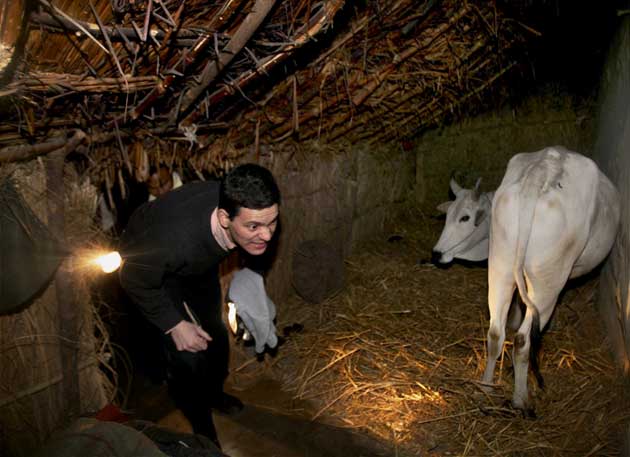Miliband's trip to India 'a disaster', after Kashmir gaffe
Foreign Secretary spends the night in a mud hut, but is criticised for 'aggressive style' in top-level talks

Your support helps us to tell the story
From reproductive rights to climate change to Big Tech, The Independent is on the ground when the story is developing. Whether it's investigating the financials of Elon Musk's pro-Trump PAC or producing our latest documentary, 'The A Word', which shines a light on the American women fighting for reproductive rights, we know how important it is to parse out the facts from the messaging.
At such a critical moment in US history, we need reporters on the ground. Your donation allows us to keep sending journalists to speak to both sides of the story.
The Independent is trusted by Americans across the entire political spectrum. And unlike many other quality news outlets, we choose not to lock Americans out of our reporting and analysis with paywalls. We believe quality journalism should be available to everyone, paid for by those who can afford it.
Your support makes all the difference.David Miliband was beginning to look as accident-prone as Mr Bean last night after yet another adventure backfired.
After ruining his chance of the Labour leadership by gurning at the cameras while brandishing a banana, the Foreign Secretary's visit to India last week was labelled a "disaster" by the country's leading politicians.
He was accused of being "aggressive in tone and manner" in a meeting with the Indian Prime Minister and Foreign Minister, and dismissed as a "young man" by senior officials.
Mr Miliband was forced to defend his three-day tour of India and Pakistan last night, insisting he had been "open and honest". The visit had been billed as a "solidarity" trip over the terrorist attacks on Mumbai. But the diplomatic row caused further embarrassment to Mr Miliband, just four months after the "banana incident" at Labour's party conference in Manchester.
While out of the country last week, the Foreign Secretary was also under fire in the UK for writing an article in which he declared the "war on terror" had been a "mistake". The remarks, in the last days of George Bush's presidency, were criticised for being ill-judged and ill-timed.
In the same article he linked the Mumbai sieges in November, which India blames on the Pakistani militant group Lashkar-e-Taiba, to the long-running dispute over Kashmir. He said: "Resolution of the dispute over Kashmir would help deny extremists in the region one of their main calls to arms and allow Pakistani authorities to focus more effectively on tackling the threat on their western borders."
Mr Miliband tried to appear at one with the Indian people by spending the night in a mud-floored hut – with a cow guarding the door – in rural Uttar Pradesh. But clearly this was not enough to win over the Indian government.
Manish Tiwari, a spokesman for the ruling Congress Party, said: "There is no linkage between Kashmir and the terror India has been facing emanating from Pakistan ... The bureaucracy in the British Foreign Office should have educated him a little bit on the facts."
Arun Jaitley, spokesman for the opposition Bharatiya Janata Party, said: "In recent years, there has been no bigger disaster than David Miliband's visit."
A government source told AFP yesterday that Mr Miliband's "aggressive style, the tone and manner in which he conducted himself during talks with the Prime Minister [Manmohan Singh] and the Foreign Minister [Pranab Mukherjee] were also upsetting".
William Hague, the shadow Foreign Secretary, said: "Good relations with India are very important to Britain, and must be handled with care and consistency. If these statements are representative of how David Miliband's visit was received, then those relations will have been damaged."
Mr Miliband is not the first Labour Foreign Secretary to ruffle diplomatic feathers over Kashmir. In 1997, Robin Cook was criticised by India for suggesting that the UK could mediate between New Delhi and Islamabad over the conflict.
A spokeswoman for Mr Miliband said: "The Foreign Secretary was very open and honest about his views, which are those of the British government. He delivered the same message in New Delhi as he did in Islamabad."
A Foreign Office official said: "The Foreign Secretary had a very good visit and what he took away to Pakistan was a very clear sense of anger felt about the Mumbai attacks and the need for decisive action by Pakistan, supported by the international community, to root out the terrorism that struck India with such devastating effect."
Join our commenting forum
Join thought-provoking conversations, follow other Independent readers and see their replies
Comments